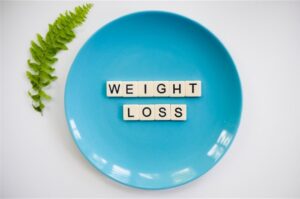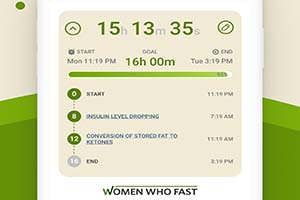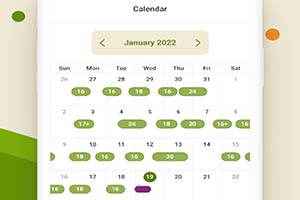
Menopause can be brutal and seems to last forever. What can YOU do to help?
Care to reminisce with me? According to medical science, it was around the age of ten when our brains sent out new kinds of messages to our ovaries. These messages triggered our ovaries to begin producing estrogen along with other sex hormones. Puberty officially began.
Remember how un-fun that transition into adolescence was? The emotional roller coasters, the cramps that kept us awake at night, the acne, the sweating, the bloating, the embarrassment…. The list goes on and on.
Little did we know this hormonal storm had a sequel named “Menopause” planned for us 40 years later. I certainly do not recall any mention of this future time of terror in the girls-only film we all watched together in elementary school, do you?
Ignorance isn’t always bliss
For most of my adult life, I kind of ignored the pained expressions and hushed whispers about menopause. How bad could a few hot flashes be? Pretty much all I knew was that my periods would be over at the end of it which sounded like good news to me. And then perimenopause showed up in my life. (Perimenopause is when you learn that menopause doesn’t play.)
(Remember, I’m not a doctor so everything I say comes from what I’ve learned from research and my own personal journey.)
Perimenopause is the period of YEARS leading up to menopause. It’s believed that perimenopause starts for each of us when our ovaries start signaling that our egg inventory is dwindling. When the body realizes we are nearing the end of our reproductive years, the production of estrogen in the ovaries begins to decrease too. That doesn’t sound too bad until you realize that estrogen is like the Queen Bee hormone in a woman’s body.

Estrogen is a bigger deal than some of us realized
According to the Endocrine Society, “It is the big drop in estrogen levels that causes most of the symptoms of menopause. Signs of low estrogen include:
- Dry skin.
- Tender breasts.
- Weak or brittle bones.
- Trouble concentrating.
- Moodiness and irritability.
- Vaginal dryness or atrophy.
- Hot flashes and night sweats.
- Irregular periods or no periods (amenorrhea).
- Weight gain, especially in your belly.
- Headaches before or during your period.
- Decreased sex drive and painful intercourse (dyspareunia).
- Feeling fatigued and having trouble sleeping (insomnia).”
I’ve realized during my research for this article that there is a lot I could have done to make perimenopause easier for myself. But I guess there’s no time like the present to work on implementing at least a few things from this list from the University of Pittsburgh Medical Center before menopause fully kicks in. (See my comments below the list items.)
Follow a healthy diet.
- Oh, if we had a dime for EVERY TIME we hear that. Usually, it’s in a “healthy weight” context but during menopause the stakes are even higher. According to UPMC, eating more fruits and vegetables and increasing calcium can translate into less bone loss and….drum roll please… DIMINISHING HOT FLASHES. If you’ve had a hot flash, you know the value of that.
- I like fruit and I wish I enjoyed fresh vegetables. Sometimes I literally have to force myself to eat them. But on the other hand, I always look forward to drinking them! Juicing vegetables removes the fiber (I’ll get
that elsewhere) but the vitamins and minerals from fresh squeezed juice is like liquid gold.
- If you don’t have a juicer, I bought this Omega Cold Press juicer a little over a year ago and I love it! My fave right now is celery juice,
spinach
and watermelon (including some of the rind). It tastes good and I DO feel better after I drink it.
Women Who Fast is a participant in the Amazon Services LLC Associate Program, which means we receive a commission if you purchase through our link, at no extra cost to you.
- Stabilize blood sugar throughout the day.
- I’m convinced there could be a comment about stabilizing blood sugar on every bit of health advice and it’s certainly appropriate here. According to the article from UPMC, rising blood sugar levels trigger weight gain and hot flashes.
- Are you eating foods that spike your blood sugar levels throughout the day? I know I am and I have a pretty good idea what foods are causing it. But recently I’ve been reading a lot about getting a glucose monitor kit and keeping track of my blood sugar so I can see exactly what I’m putting my body through. If you’ve tried this, would you email me at support@womenwhofast.com and tell me about your experience?
- Intermittent Fasting can help with this too:
- According to Tempo 2021, implementing an intermittent fasting schedule can help improve control over blood sugar levels by creating a period where insulin levels remain low.
- Research shows that fasting can improve your metabolism, mental health, and possibly prevent some cancers. It can also ward off certain muscle, nerve, and joint disorders which can affect women over 50. (WebMD-2021)
Experts agree that intermittent fasting is not for everyone. Please read our Terms of Use.
- Increase vitamin D.
- Over the years, you’ve probably picked up on the fact that Vitamin D deficiency is somewhat common. According to UPMC, Vitamin D can help minimize hot flash symptoms, improve your mood, and even help that foggy brain that seems to be moving mighty slow these days. So be sure your doctor checks your Vitamin D levels at your next appointment.
- If your Vitamin D levels are low, your doctor may recommend a supplement. But until you know for sure, consider spending short
amounts of time relaxing in the sun. And yes! You do still need to wear sunscreen while soaking in Vitamin D.
- I work from home, so makeup is optional most days. But sunscreen isn’t! CeraVe makes a tinted sunscreen complete with hyaluronic acid that I consider makeup most days.
- Eliminate caffeine, alcohol, and refined sugars.
- Or at least try to cut back as much as possible. Did you know these naughty things increase hot flashes, night sweats, racing heart symptoms, and insomnia? (UPMC)
- Drink plenty of water.
- You already know how important it is to drink 8-12 glasses of water each day. Don’t stop now. Lower amounts of estrogen can affect the collagen in your skin causing it your skin to feel and look tight and, well, old. So stay hydrated!
- If you want to be proactive with the collagen, there are several types of
collagen supplements on the market. I’ve chosen to try
Vital Proteins Collagen Peptides Power with Hyaluronic Acid and Vitamin C: It helps skin, hair, joints and digestion and plus, it has hyaluronic acid and Vitamin C! I usually always like products that include this pair. In fact, I’ve recently discovered how miraculous they work on my skin.
- Exercise regularly.
- I am so over feeling bitter and hateful about exercise. All of my life I’ve known I need to exercise more to burn calories so I won’t gain weight. And as a result, I have no doubt spent more time dreading, postponing, and skipping exercise than I have exercising!
- But this time, it isn’t just about the weight. Now it’s also about preventing bone loss during menopause. Since it’s not likely I’m going to increase my bone density at this age, this is something I want to get on top of. Plus, exercise does help with stress, sleep and crankiness.
- If you want to try something that doesn’t make you feel like a sweaty mess, I would recommend Walking With Leslie for 10 or 15 minutes a few times a week. It’s easy, you can do it inside, and you will feel good about yourself afterwards. She may seem a little corny at first, but you will end up appreciating her cheerful encouragement. 🙂
- Try a richer moisturizer.
- According to UPMC, collagen can drop by as much as 30% during menopause, leading to thin and dry skin. I mentioned a collagen supplement above to help with this, but it may also be time to find a richer moisturizer.
- I love the way Remedial Pax Day & Night Retinol & Collagen feels on my skin. Sometimes I’m not good about moisturizing twice a day, so I had to buy something I could use in the morning or at night. This stuff feels so good and I can tell a difference in how my skin feels and the appearance of it as well. (I would recommend using this every two to three days in place of your normal moisturizer.)
- According to UPMC, collagen can drop by as much as 30% during menopause, leading to thin and dry skin. I mentioned a collagen supplement above to help with this, but it may also be time to find a richer moisturizer.
- Make sleep a priority.
- Getting plenty of sleep was good for us as babies, children, teenagers, and young adults. And it’s just as important during menopause. The problem is, the decreasing estrogen causes insomnia, hot flashes and night sweats. The closer I get to full blown menopause (when I haven’t had a period for a year), the harder it gets to enjoy a good night’s sleep.
- About two years ago I purchased a small space heater that will also blow out “cool” air. About three months ago I put it on a dresser close to my bed and it now blows cool air on me all night. If I’m still having hot flashes at night, I’m not feeling them.
- Dawn swears by Bamboo cooling sheets. I recently slept on some and it made such a huge difference!
- Strengthen pelvic muscles.
- The drop in estrogen and corresponding decrease in collagen negatively affects muscle strength and can really aggravate urinary incontinence. We all know that we are supposed to be doing kegels (for all kinds of personal reasons). But if your kegels aren’t working as well as you’d like, you might want to consider a pelvic floor exerciser? This isn’t something I’ve tried but I certainly will if I ever need to. Some of the pelvic floor exercisers are gamified to make exercising your Kegels a little more interesting.
- Ask your doctor about vaginal estrogen therapy.
- If you are suffering from vaginal dryness and discomfort during intercourse, be sure and talk to your doctor. (Estrogen therapy is not for everyone.)
Like I said before, menopause doesn’t play. Many women (including myself) seek counseling during this time for relief from some of the mental and emotional side-effects of menopause If you are struggling, please talk to somebody. Now is not the time to tough it out!
Fortunately, the symptoms of menopause will eventually decrease as the body transitions to getting most of its estrogen from…plot twist…your fat cells!!! We will talk more about that soon. Please take care of yourself! -Kim



















